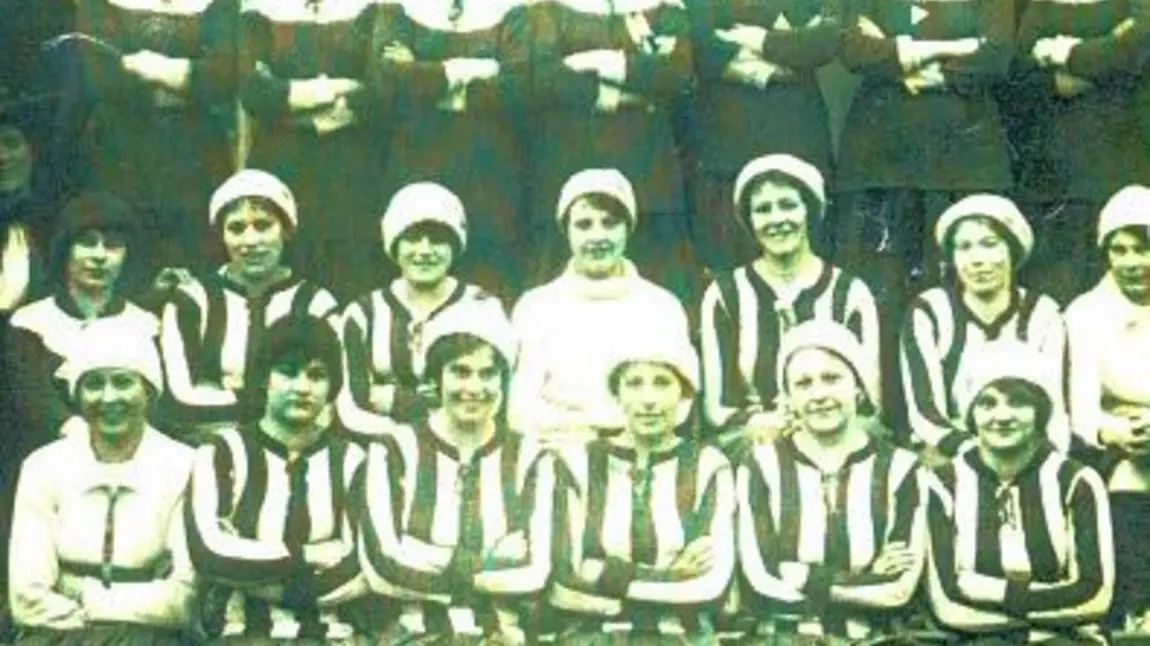First World War women’s football match recreated

A football match that recreated a game played during the First World War between women from Coventry’s munitions factories took place place on Bank Holiday Monday.
A large crowd watched players from Coventry City Ladies FC play the match at the Butts Park Arena. They were wearing First World War era kit with the names of the original players printed on their backs.
The match is part of a project called ‘No Game for Girls’, run by community interest company Eyefull Media and funded by the Heritage Lottery Fund (HLF). It seeks to tell the untold story of women’s football during the War.
The original match was held in 1917 between Rudge-Whitworth and Humber Ladies, two of the teams who formed the short-lived Ladies Football Association along with women from other factories run by Coventry Chain, Daimler, White & Poppe and Coventry Ordnance.
Known as the ‘munitionettes’, the women worked long hours in dangerous conditions manufacturing weapons. They spent their leisure time playing football at local grounds including Highfield Road, the former home of Coventry City FC. The games were popular and spectators donated large sums of money to help soldiers injured at the Front, making them the ‘Help for Heroes’ of their day.
Despite the popularity of the teams, there were those who objected and the women’s efforts were attacked by an Anti-Women’s Football campaign.
England and Birmingham City midfielder, Karen Carney, said: “It’s been incredible to discover that during the First World War women were playing football in front of huge crowds. Today, we’re in a fortunate position to be paid for playing the game but these women loved the sport so much that they did it whilst working long, gruelling hours in factories and donated funds to treat injured soldiers. I can’t think of a better way of remembering what these inspiring footballers achieved than staging this match.”
The project received a £56,400 grant from HLF in May 2014. They will now create an online archive, a short film and a travelling exhibition to tell the story of individual munitionettes as well as their footballing triumphs.
Researchers have already discovered that two sisters who played for the Rudge Whitworth factory team – Lucy and Dorothy Yeomans – were the aunts of former Coventry City and Nottingham Forest player Ken Brown.
Fran Porter, Director of Eyefull Media, said: “It’s been an incredible project so far. It’s gained so much support from the community and Coventry’s football fans, and really fired the city’s passion for its football history. So many people are surprised that women played as early as 1917, and they just want to know more about the subject now.”
HLF has funded nearly 900 First World War centenary projects - both big and small - across the country with awards totalling over £58million.
Reyahn King, Head of HLF West Midlands, said: “These War-time football matches that entertained many, but were viewed as scandalous by some, show how the conflict changed perceptions of how women should behave. The skills, goals and atmosphere on show at this commemorative match brought all this to life, helping to tell the munitionettes’ untold story.
“HLF is supporting projects across the country that explore the impact of the War on communities. Together these hundreds of projects are forming a rich picture of life at the time and will ensure that the centenary leaves a lasting legacy.”
Further information
HLF press office: Tom Williams on 020 7591 6056, email: tom.williams@hlf.org.uk
Fran Porter, Eyefull Media CIC on 02476 550 372, email: franporter@me.com.